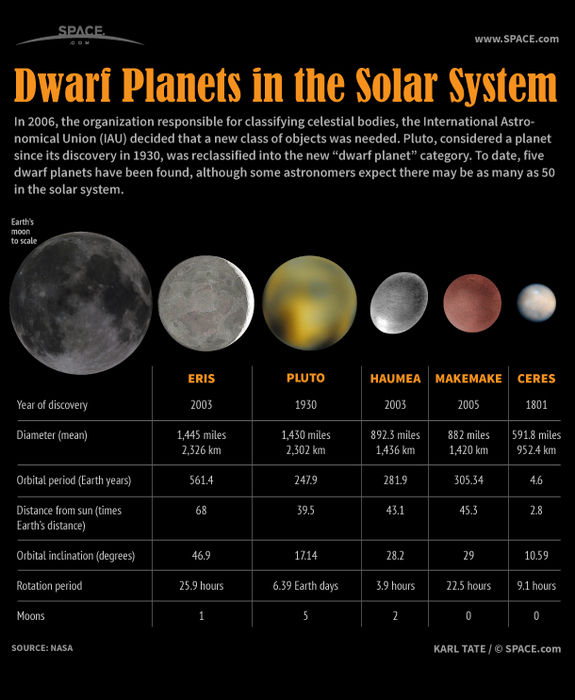In 2006 the organization responsible for classifying celestial bodies, the International Astronomical Union, decided that a new class of objects was needed. The solar system’s erratic ninth planet, Pluto, was assigned to the new “dwarf planet” category along with four other bodies, all tinier than Earth’s moon. Some astronomers expect there may be as many as 50 dwarf planets in the solar system.


Source SPACE.com: All about our solar system, outer space and exploration
Eris, the largest dwarf planet, is only slightly bigger than Pluto, at 1,445 miles in diameter (2,326 km). Discovered in 2003, Eris orbits at an average distance of 68 AU (that is, 68 times the Earth’s distance from the sun) and takes 561.4 Earth years to circle the sun. Eris has the orbit that is most highly inclined of all the dwarf planets, tilted nearly 47 degrees from the plane of the planets’ orbits. A day on Eris takes 25.9 hours. Eris has one moon, Dysnomia.
Pluto, discovered in 1930, orbits the sun at an average of 39.5 times the Earth’s distance. Its diameter is 1,430 miles (2,302 km). Pluto takes 247.9 Earth years to orbit the sun, and its day is 6.39 times as long as Earth’s. Pluto has five known moons: Charon, Nix, Hydra and two that were recently discovered and have not yet been named.
Haumea was discovered in 2003. This dwarf planet has an extremely elongated shape, with its longest dimension being about 1,218 miles long (1,960 km). Haumea rotates very rapidly and has the shortest day of all the dwarf planets, only 3.9 hours. Orbiting 43.1 times farther from the sun than Earth does, Haumea takes nearly 282 Earth years to complete one orbit. Haumea has two moons, Hi’iaka and Namaka.
Makemake, discovered in 2005, has no known moons. Makemake orbits at 45.3 times Earth’s distance and takes more than 305 years to complete a circuit of the sun. Its day is 22.5 hours. Makemake’s average diameter is 882 miles (1,420 km).
Ceres, first spotted by astronomers in 1801, was first called a planet and later an asteroid. In 2006 it was reclassified as a dwarf planet. Ceres is the closest dwarf planet to Earth, orbiting at only 2.8 times Earth’s distance from the sun. Its year takes 4.6 Earth years and its day is 9.1 hours. Ceres has no known moons.
Meet the Dwarf Planets of the Solar System (Countdown)
Images: Dwarf Planet Eris, Pluto’s Cosmic Twin







